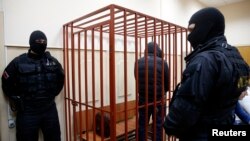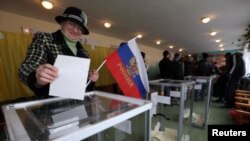Russia is using its anti-extremism laws to crack down on dissent, analysts and human rights advocates say.
A recent study found that the number of Russians sentenced to prison for extremism tripled over the last five years. A growing number of journalists and dissidents say they have been targeted by prosecutors.
Journalists and dissidents are not the only ones. Yekaterina Vologzheninova, a 46-year-old single mother working as a cashier in the central Russian city of Yekaterinburg, was among the first Russian citizens accused of extremism after she used social media to share links concerning the Ukraine conflict.
Vologzheninova was convicted in April for criticizing online Russia’s annexation of Crimea and military involvement in eastern Ukraine, and sentenced to 320 hours of “corrective labor.” The judge also ordered that her laptop be destroyed as a “tool of crime.”
According to the indictment, Vologzheninova reposted and “liked” posts it described as “insulting and degrading to Russian people.” One post that was presented as evidence against her featured a picture of a man, who resembled President Vladimir Putin, holding a knife over a map of Ukraine’s Donbas region, with “Stop the Disease” written underneath.
Life destroyed
Vologzheninova told VOA in a phone interview from Yekaterinburg that the case had destroyed her life, leaving her jobless and her family in a state of constant fear about the future.
“After the trial I lost my job, and I don’t think I will be able to find any other jobs anytime soon,” she said, adding that she needs to provide for her 13-year-old daughter and the only income the family has now is her grandmother’s pension.
Still, Vologzheninova said she has not encountered hostility from local people due to her conviction for “extremism.”
“Neighbors don’t really talk to me, but nobody has thrown stones at me either,” Vologzheninova said. She added that she wants to leave for a safer country, but Russia's new anti-extremism laws prohibit foreign travel for those convicted.
As a result, Vologzheninova said, she feels trapped and insecure. “I think this will not be the end of my troubles,” she said. “I, and people like me, will be prosecuted on every level.”
According to a report by the Center for Economic and Political Reforms (CEPR), an independent Russian research institution, the number of people imprisoned on extremism-related charges jumped from 137 in 2011 to 414 in 2015.
In its latest annual human rights report, released in April, the U.S. State Department said Russian authorities last year “continued to misuse the country’s expansive definition of extremism as a tool to stifle dissent.”
“As of September 29, the Ministry of Justice expanded its list of extremist materials to include 3,072 books, videos, websites, social media pages, musical compositions, and other items, an increase of more than 600 items from the same date in 2014,” the State Department report said.
US seen behind ‘information war’
In an article published in April by the weekly magazine Kommersant-Vlast, Russia’s top investigator, Alexander Bastrykin, said Russia was the victim of “a so-called hybrid war unleashed by the United States and its allies.” He accused the U.S. of launching an “information war” against Russia and “supporting radical Islamist and other radical ideological trends.”
Bastrykin, who heads the powerful Investigative Committee, said that in order to respond to this assault and counter “extremism,” Russia needs to “define the boundaries of censorship” of the Internet in the country. He cited China as an example to follow.
He also proposed expanding current anti-extremism legislation to cover “the falsification of information about historical facts and events,” including “denial of the results of a popular referendum” like the one Moscow used to justify its annexation of Ukraine’s Crimea in 2014.
According to results published by the referendum’s organizers, 95 percent of Crimea’s voters supported the peninsula becoming part of Russia.
In early May, Anton Bubeyev, an engineer from Tver, an industrial city near Moscow, was sentenced to 27 months in prison for reposting on his blog a picture of Crimea with a sign "Crimea is Ukraine" – an act that the court which tried him judged to be “extremist.”
Another case is that of Alexander Sokolov – who, according to the RBC news agency, has been incarcerated since July 2015 on extremism charges. He stands accused of "attempting to overthrow the government" for proposing that a referendum be held on "government accountability."
Sokolov appealed to the European Court of Human Rights last December and the Russian authorities, including the prosecutor general’s office, earlier in May. On May 23, a Moscow court denied Sokolov’s appeal, extending his incarceration indefinitely.
Sokolov says he is being prosecuted for investigating schemes that Russian government agencies used to "steal money" from various high-profile projects, including the 2014 Sochi Olympics. The Russian human rights group Memorial has designated Sokolov a "political prisoner."
Black list
Last December, the director of the Ukrainian library in Moscow, Natalia Sharina, was charged with extremism and detained for three days after Russian security services searched the library and allegedly discovered “anti-Russian” books. She remains under house arrest.
The Russian government’s extremism.rf website lists 68 organizations and groups that have been banned for “extremism” – 45 are on the Russian Justice Ministry’s “official list” of extremist groups and 23 have been designated as terrorist organizations by Russia’s Supreme Court.
The website also has a section titled “Where to complain about extremism?” which instructs visitors how they can “send complaints about sites disseminating extremist information” to the Russian Interior Ministry’s Main Department for Combating Extremism.
Meanwhile, the Russian government is gradually expanding its surveillance programs. According to a recent study by the Agora research group, over the last nine years, Russian courts have approved requests by the security services for surveillance of 9 million people, or roughly 6 percent of the nation’s total population.
In mid-May, the State Duma, the lower chamber of parliament, approved in its first reading a new set of anti-terrorist/extremist bills that go well beyond Alexander Bastrykin’s proposals.
Among the proposals: anyone who has received an official warning concerning “actions creating the conditions for committing terrorist crimes, [for] the outbreak of war or [for] genocide” can be prevented from leaving Russia for up to five years from the date the warning was issued.






